Accreditation and licensing
To implement a new study programme, a higher education institution must submit the programme's licensing documents to the Quality Agency for Higher Education (QAHE). After an evaluation procedure and verification of compliance with all requirements, QAHE approves the implementation of the new study programme following its licensing.
Since 2019, accreditation of study fields has been carried out in Latvia. A study field includes study programmes within a specific thematic areas. The assessment of the study field depends on the overall evaluation of its programmes. Planning work is currently underway at the national level to transition to cyclical institutional accreditation of higher education institutions, which is scheduled to begin in 2026. Further information on the accreditation of study fields is available on the QAHE website.
The Study Quality Department (SQD) provides support in licensing and accreditation documentation, programme development and modifications, as well as in facilitating cooperation between employers, graduates, and students.
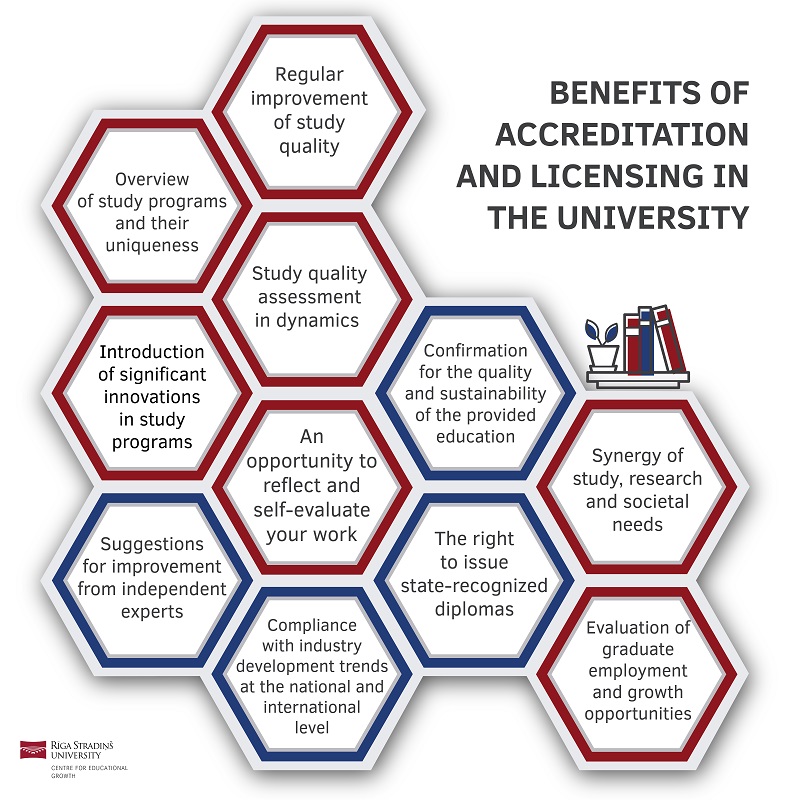
Development and licensing of new study programmes
At RSU, new study programmes are developed in line with the core principles outlined in the RSU Development Strategy. These principles include fostering student engagement in scientific research, integrating research into the study process, ensuring a sustainable educational offer, promoting cooperation, advancing digital transformation, managing resources effectively, and supporting the development of internationalisation.
- 1. Planning the development process
A working group for developing a new study programme(StP) is established in collaboration with the relevant faculty and departments, the Centre for Educational Growth (CEG), the management of the study field, and the initiator of the study programme. The team members and the desired timeline for receiving the licence are defined, taking into account the time required for document submission and the activities to be carried out before submission. The developer of the StP, who will lead the working group, is selected and approved by the faculty.
- 2. Research
In order for RSU to coordinate the development of a new StP, research is conducted and a presentation is prepared for RSU management on the following issues: description of the idea of the StP, relevance, justification (research); StP objectives, parameters; possibility of developing StP as a sub-programme or module of another StP; compliance with industry and market demand, employer support and involvement in StP development, job opportunities for graduates; characteristics and number of potential students; similar StPs in Latvia and abroad; possible partnership with Latvian or foreign universities; elimination of internal competition and cooperation, for example, in the sharing of courses; resources necessary for the implementation of StP; planned study courses; faculty; draft development plan, representatives of the working group involved, deliverables, budget.
- 3. Coordination of the development
With the support of the faculty, CEG, and SQD, the idea of the study programme, its relevance, and justification are discussed. SQD provides advice on the study programme development process and further cooperation. The vice-rector for academic affairs, involving management or other representatives as necessary, approves or rejects the further development of the programme.
- 4. Content modelling
The process of modelling the study programme spans a period of 3 to 6 months, during which the study programme developer works closely with a specialist from SQD. The SQD offers essential support, including guidance on required resources and assistance from administrative units, recommendations on content modelling, content review, quality improvement, and contributions to the development of the content.
To ensure that the study programme aligns with the needs of the industry and stakeholder requirements, it must be discussed and reviewed with:
- Industry experts and employer representatives
- Academic staff
- Students from other similar study programmes, as well as representatives of the Student Union
Focus group discussions are organised and moderated to gather feedback and proposals for the study programme content. These proposals are collected, evaluated, and feedback is provided to the proposers regarding the feasibility of implementation.
As a result of this process, the working group, in collaboration with the support units involved, prepares the study programme plan, the list of academic staff, the budget estimate, the mapping against the Cabinet Regulations, the occupational standard, and the study courses. The final outcome is agreed upon at the Faculty Council and RSU Rector's Office.
- 5. Development of study courses
Once the StP plan has been developed, the working group organizes the development of study course descriptions. Additional experts are involved in the process as necessary. In cooperation with CEG, joint and individual consultations are organized for lecturers to ensure the high quality of study courses. It is recommended to organize at least two lecturer workshops, where lecturers evaluate and analyze the study programme, reflect on the place and role of their study courses in the study programme, as well as present the developed study courses and discuss their content. If possible, the working group involves experts in evaluating the quality of study courses and providing feedback to lecturers.
As a result of this process, the completed study courses are approved by the relevant Faculty Council and submitted to the Academic Portal, where they are reviewed and approved by a specialist from the Study Department.
- 6. Development of description and annexes for licensing
The development of the study programme licensing description and appendices takes place in parallel with the development of course descriptions and lasts approximately four months. The director of the study programme and the partners involved, in cooperation with the SQD and other administrative units, develop the licensing documentation in accordance with the regulatory enactments in force.
- 7. Compilation, coordination and approval of licensing documentation
The process lasts three months, during which time the SQD edits, formats, and compiles documents, organizes independent expert reviews of licensing documents, and coordinates the internal approval of documents, which is carried out by the Study Quality Council, the Faculty Council, the Dean's Council, and the Rector's Office. The documents are finally approved by the Senate.
- 8. Submission of documents
SQD, in cooperation with the director of StP, submits licensing documentation to QAHE after receiving the extract from the Senate hearing where the documents have been approved.
- 9. Licensing process after submission of documents to QAHE
SQD cooperates with QAHE in evaluating the programme to be licensed and coordinates the necessary support from RSU structural units in the licensing process. The most important stages are the submission of additional information, the organization of expert visits, the evaluation of the opinion and the development of a plan for the implementation of the recommendations made by the experts, the elimination of deficiencies, as well as participation in the meeting of the Study Quality Commission at the licensing decision-making meeting.
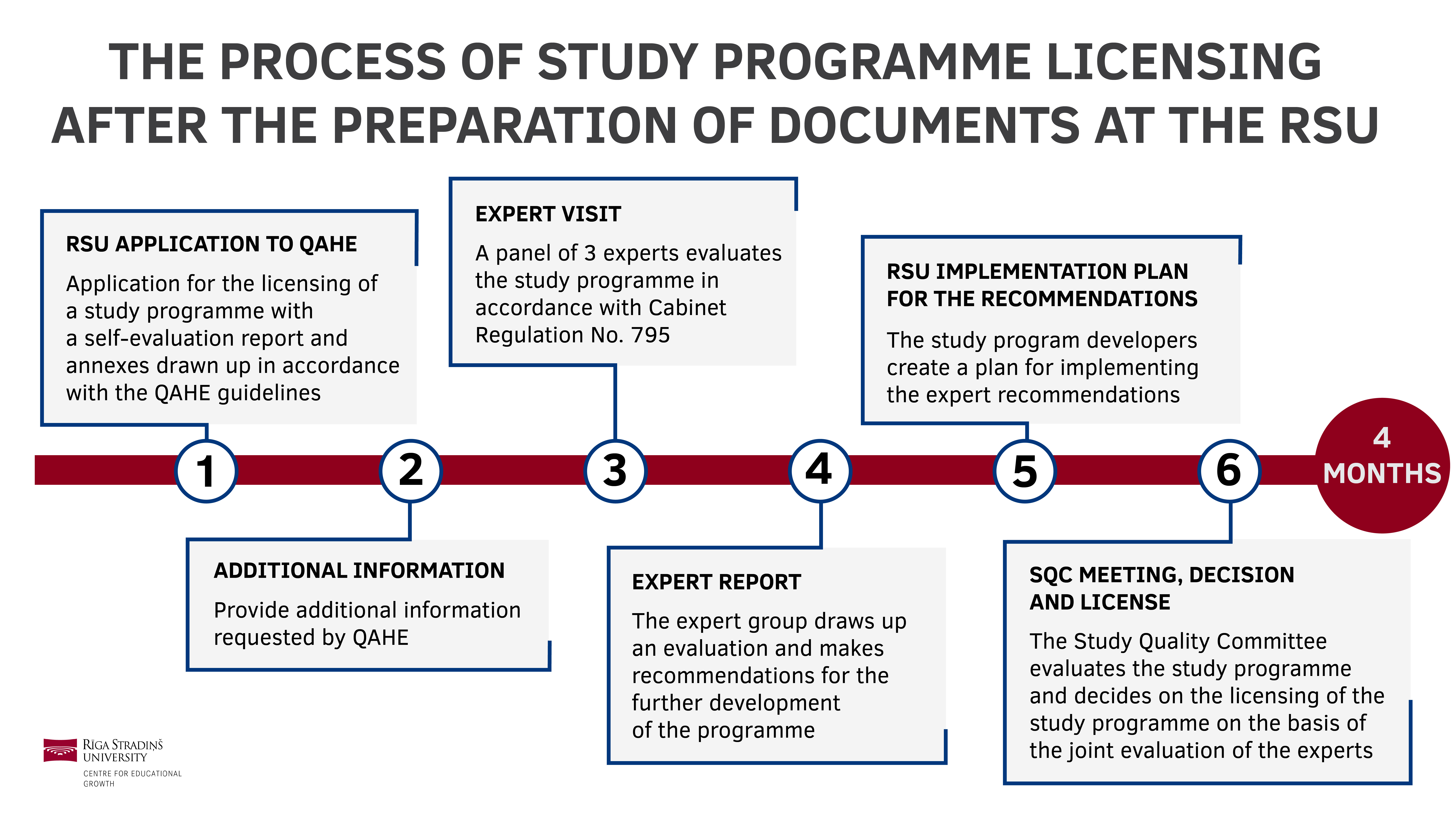
Accreditation of the study field
The accreditation procedure takes at least 10 months, so documents for accreditation must be submitted 10–12 months before the end of the previous accreditation period. Work on preparing accreditation documents must begin approximately two years before the expiry of the study field accreditation term. The SQD manages, organizes, coordinates, and supervises the preparation of RSU accreditation documents.
- Preparation of accreditation documents
The preparation of accreditation documents follows a process similar to that of licensing documents. However, in this case, existing study programme documents are reviewed and updated for submission. Accreditation documents are prepared in accordance with Process Description No. 34(7) "Updating and Development of Study Courses, Study Programmes and Study fields".
The accreditation of a study field consists of two stages following the submission of documents to QAHE:
- Assessment of the study field – This includes the evaluation of the self-assessment report submitted by the higher education institution (application, descriptions of the study field and study programme(s), and annexes), an on-site visit by experts, and the preparation of an expert opinion based on predefined criteria.
- Accreditation of the study field – This involves the decision to grant accreditation for a specified period.
- Accreditation process after submission of documents to QAHE
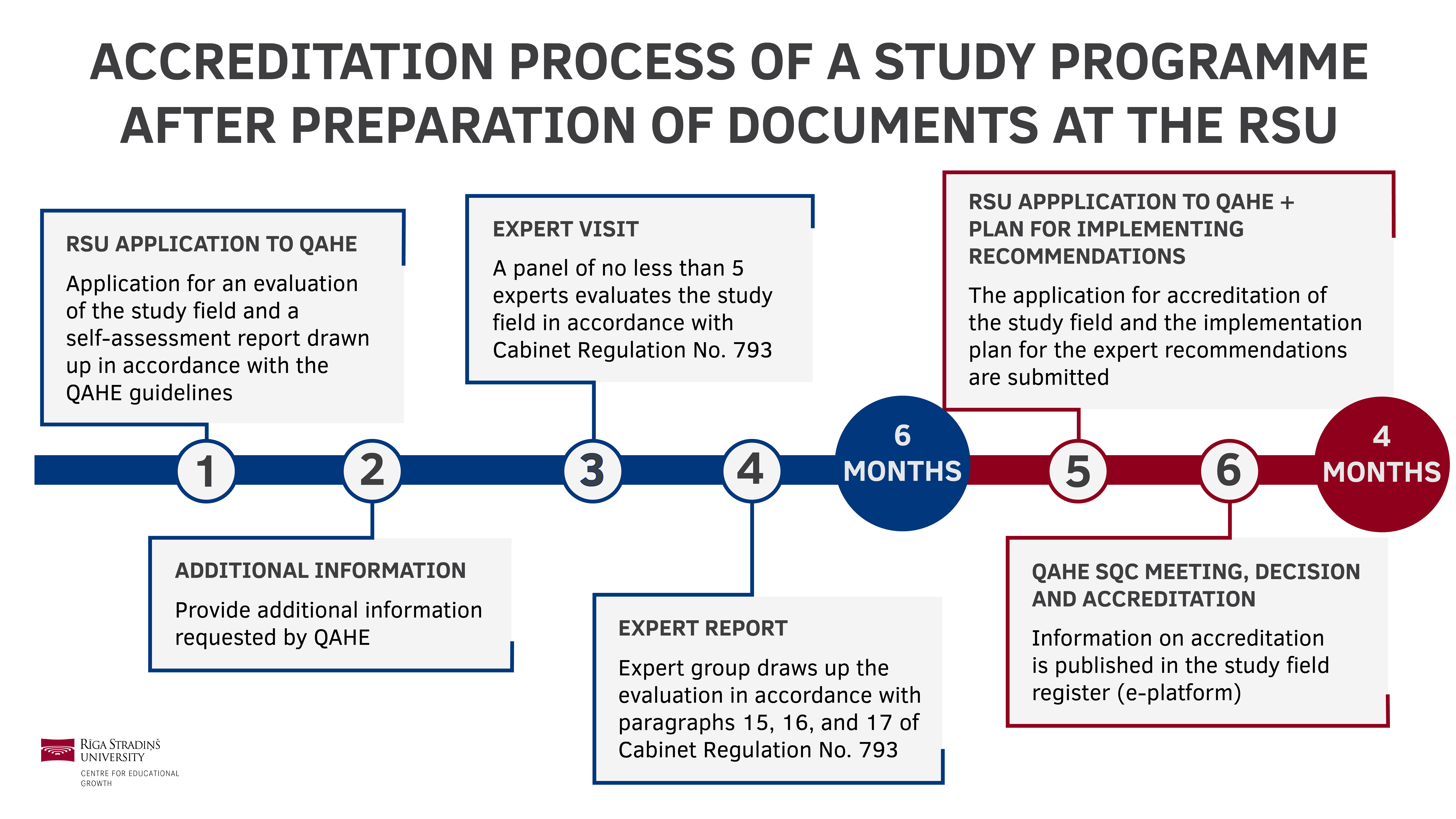
Documents regulating accreditation and licensing
Law on Higher Education Institutions
Cabinet Regulations No 793 “Regulations for Opening and Accreditation of Study Fields”
Cabinet Regulations No 795 “Regulations on Licensing of Study Programmes”
Cabinet Regulations No 240 “Regulations regarding the State Standard for Academic Education”
Cabinet Regulations No 322 “Regulations on the Education Classification of Latvia”
Cabinet Regulations No 202 “Procedures for Issuing State-recognised Higher Education Documents”
Cabinet Regulations No 49 “Regulations on Sectors and Sub-Sectors of Science in Latvia”
Law “On the Regulated Professions and the Recognition of Professional Qualifications”
Accreditation and licensing
Related news
 RSU launches new master's programme in digital strategy and artificial intelligenceFor Students, Accreditation, Licensing, For RSU Employees, Internal consolidation
RSU launches new master's programme in digital strategy and artificial intelligenceFor Students, Accreditation, Licensing, For RSU Employees, Internal consolidation Medical studies with global value! RSU is in the process of accreditation with an agency recognized by the World Federation for Medical EducationFor Students, Accreditation, Licensing, For RSU Employees, Development, International Cooperation
Medical studies with global value! RSU is in the process of accreditation with an agency recognized by the World Federation for Medical EducationFor Students, Accreditation, Licensing, For RSU Employees, Development, International Cooperation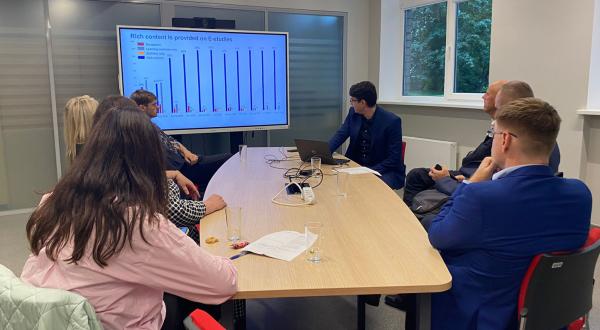 Accreditation experts assess the Internal Security and Civil Protection study fieldFor Students, Accreditation, Licensing
Accreditation experts assess the Internal Security and Civil Protection study fieldFor Students, Accreditation, Licensing International accreditation experts commend RSU's Health Care study directionAccreditation, Licensing, For Students, For RSU Employees
International accreditation experts commend RSU's Health Care study directionAccreditation, Licensing, For Students, For RSU Employees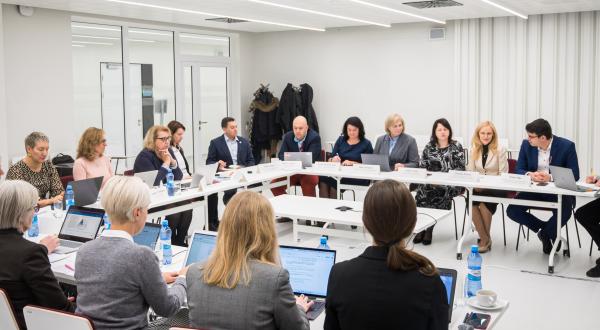 Accreditation of Health Care study direction scheduled for this weekAccreditation, Licensing, For Students, Development, For RSU Employees
Accreditation of Health Care study direction scheduled for this weekAccreditation, Licensing, For Students, Development, For RSU Employees






